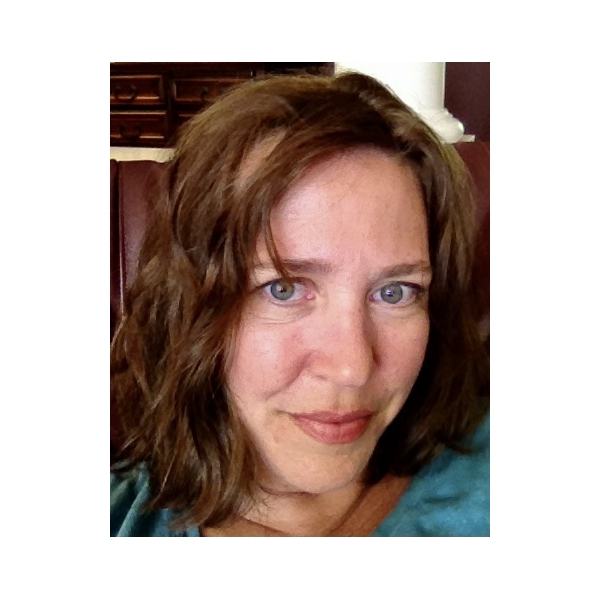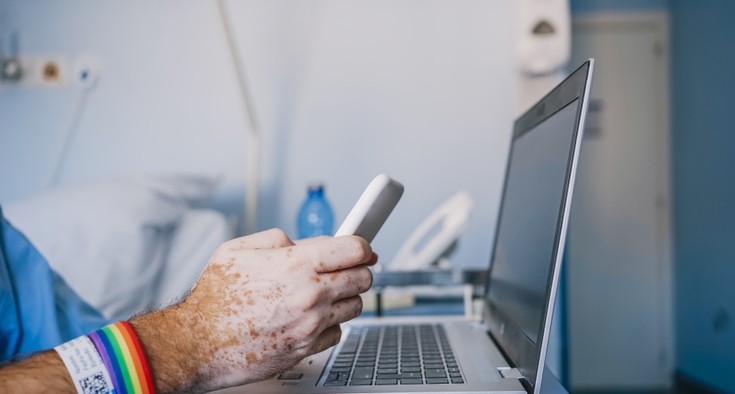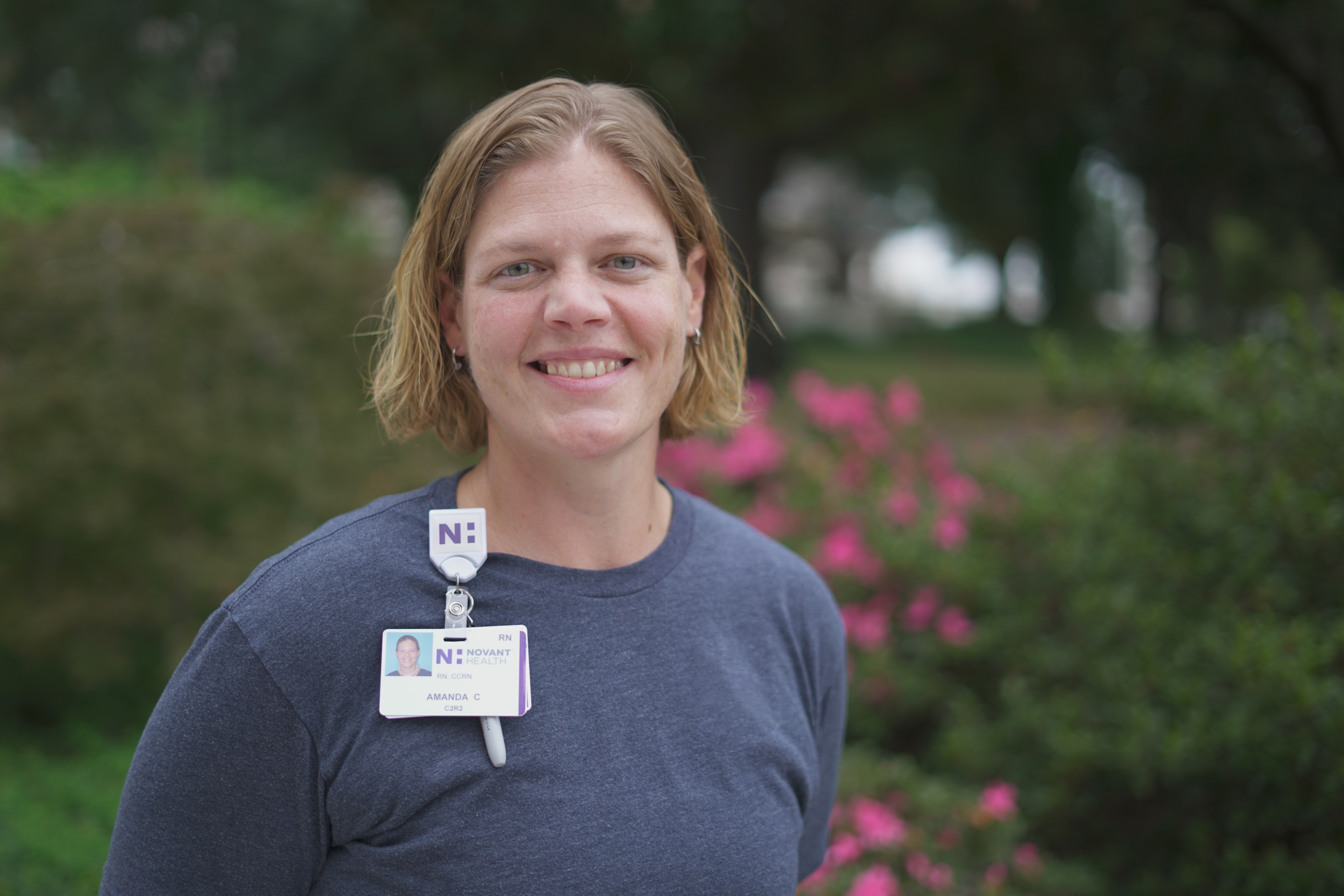
The hospital can be a scary place for patients and their loved ones. But, for the 11 million-plus people in the U.S. who identify as lesbian, bisexual, gay, transgender, queer and other sexual orientation and gender identities (LGBTQ+), it can be even tougher.
“Hospital settings can make LGBTQ+ community members feel vulnerable, especially when they first arrive,” said Amanda Cummings a critical care nurse at Novant Health New Hanover Regional Medical Center, in Wilmington, North Carolina.
“They’re not sure who they can trust, who they can talk to honestly — and we need to be able to trust our health care providers.”
Unfortunately, due to past experiences, and the fear of discrimination or that they won’t be understood, LGBTQ+ people are less likely to seek medical care. And, avoiding medical care — including preventive screenings — results in higher rates of certain cancers and chronic life-threatening conditions.
Motivated to make a difference
Witnessing this fear and vulnerability among her patients disturbed Cummings, 39, a lifelong North Carolina resident and member of the LGBTQ+ community, whose parents both taught in the nursing program at the University of North Carolina at Wilmington.
Cummings started at New Hanover nearly 18 years ago, as a nursing assistant. Two years later, she earned her bachelor’s degree in nursing from UNCW, followed by a master’s in nursing education from East Carolina University.
Now married, with two sets of twins and two dogs, she’s a critical care nurse in New Hanover’s coronary care unit (CCU) and serves on the hospital’s critical care resource nurse team — work she loves for its infinite variety.
Never one to watch from the sidelines, she decided to create an “Ally Team” of hospital team members dedicated to meeting the needs of LGBTQ+ patients and their loved ones. And, in early 2018, she began researching ways to bring her concept to fruition.
A ‘radical’ rainbow wheelchair
“Wheelchairs are always in demand at hospitals,” said Amanda Cummings a critical care nurse at Novant Health New Hanover Regional Medical Center. “And, because they’re mobile, it’s easy for different units to ‘borrow’ them from each other when a need arises.”
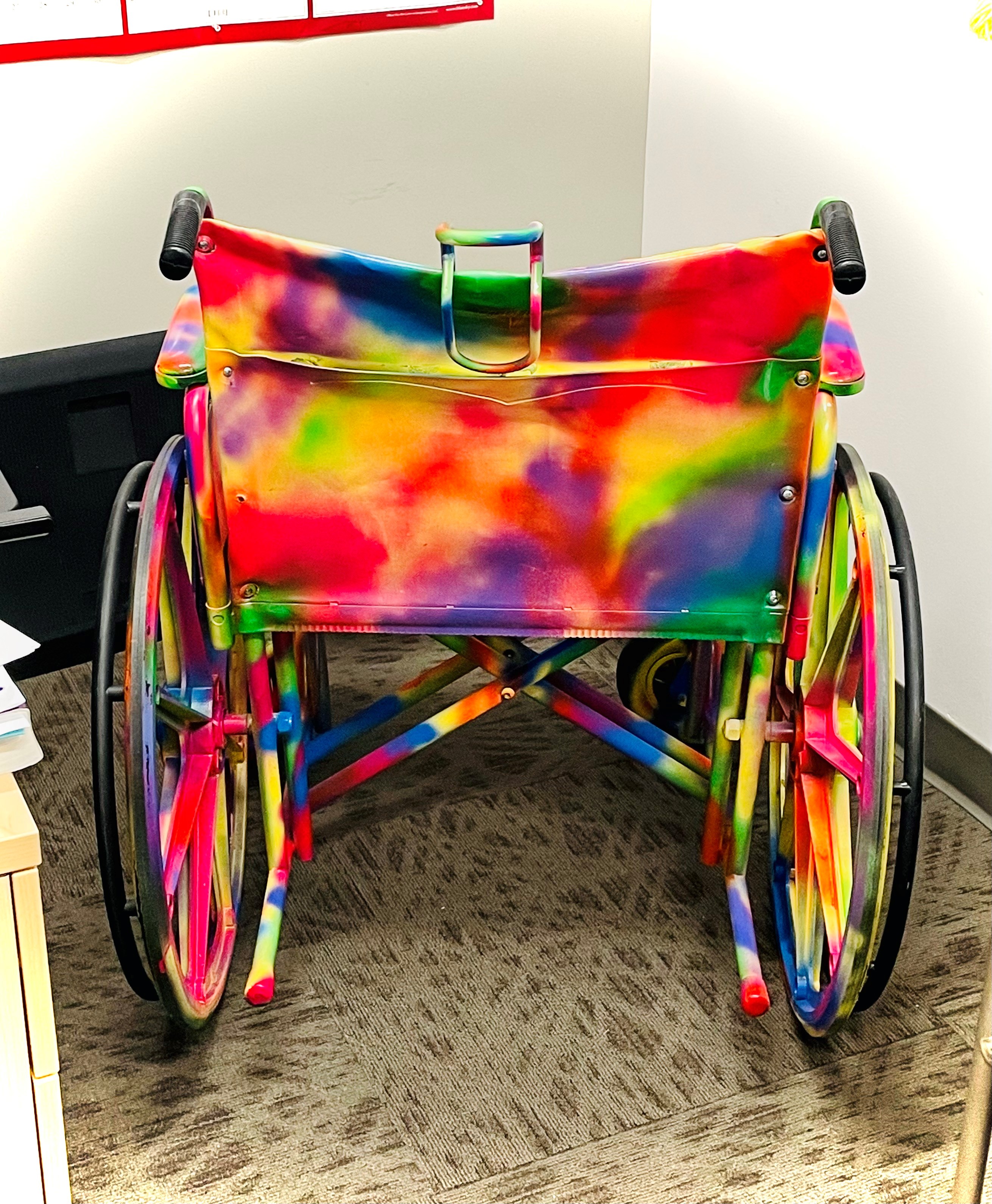
So, when her unit received a new, dedicated wheelchair, Cummings and her manager decided to protect it by making it uniquely theirs. She came up with several ideas and, with her manager’s approval, settled on painting the wheelchair in a rainbow tie-dye pattern.
“I love the idea of rainbow tie-dye, because there's nothing more inclusive,” she said. “It goes beyond being LGBTQ+ inclusive. It’s got every possible color intermingling all over the place, all of them touching and relating to each other.”
Thanks to her artful paint job, the CCU is now home to the hospital’s favorite wheelchair. And these days, with its easy-to-spot bright colors, it’s never hard to find.
“Plus, patients absolutely love it,” Cummings said. “They're like, ‘This is so radical — I want to ride in the radical chair!’”
Bringing the idea to life
“I decided to tackle it as a professional development program that encourages nurses to get involved and help promote change,” she said. “I also involved the hospital’s LGBTQ+ employee resource group, who were working to achieving the Human Rights Campaign’s ‘Leader in LGBTQ Healthcare Equality' designation.” (Known internally as business resource groups or BRGs, the resource groups are team members organized around an aspect of common identity such as age, race, sexual orientation, veteran status and other groupings. They work to support each other and Novant Health priorities.)
To staff the Ally Team, Cummings issued an invitation to prospective team members, who earned continuing professional education credits, learned about health equity and disparities, and familiarized themselves with terminology, pronoun usage and cultural appropriateness in relation to the LGBTQ+ community.
In October 2019, she launched the Ally Team in all of New Hanover’s ICUs. Signs explaining the team’s purpose were posted in the hospital’s four ICU locations — the critical care unit, cardiovascular intensive care unit, surgical trauma intensive care unit and medical intensive care unit — to ensure LGBTQ+ patients knew it existed.
“Our primary goal was to provide an easy way for patients to connect with a team member they know to be an LGBTQ+ ally,” she said. “Ally Team contact information is available in our phone paging system, so the entire hospital can contact team members trained to answer their questions and address concerns.”
Throughout the process of launching the Team, Cummings was buoyed by the positive momentum — both in and around New Hanover County — for raising awareness of LGBTQ+ health care needs and acceptance.
"There will always be a few voices questioning the value or necessity of new ideas, but with team support, a positive mindset and welcoming hearts, we planted our feet and pushed on through to become the voice of advocacy for this community."
Providing information — and peace of mind
Over the past few years, Ally Team members have assisted LGBTQ+ patients and others with a variety of situations. Ally Team members have helped people figure out how to become the designated health care power of attorney, or navigate HIPAA forms so that selected people can receive medical updates. These processes, Cummings said, can be very complicated for the LGBTQ+ community.
“One patient called us to his room and told us how scared and nervous he was when he arrived,” she said. “And he was even more nervous to ask his partner to join him, because he wasn't sure how their relationship would go over” at the hospital, she said.
As he moved through the hallway though, the two men noticed a tiny pride flag sticking out of a team member’s mailbox. And when they got to his room, they saw the sign advertising the Ally Team. He instantly relaxed and felt comfortable asking questions he might otherwise have withheld.
“Knowing about the Ally Team didn’t affect the medical care he received, but it did make him feel safe and gave him a peace of mind that could boost his chances of a better outcome,” Cummings said. “And that really validates the need for this team, and encourages us to continue doing what we’re doing to provide care for this community.”
How Novant Health is ensuring better outcomes for LGBTQ+ patients

Research shows that when LGBTQ+ patients have higher levels of trust in their health care providers, communication improves. The evidence-based result? Better health outcomes for patients who identify as lesbian, gay, transgender, queer and other sexual orientations and gender identities.
Caring for the LGBTQ+ community is a critical part of Novant Health’s commitment to diversity, inclusion and equity.
That’s why Novant Health — recognized, along with 14 of its hospitals, as a “Leader in LGBTQ+ Healthcare Equality,” by the Human Rights Campaign — is working to identify and eliminate health care disparities and improve cultural competence.
Here are three of the many steps Novant Health has taken to improve access to health care and meet the unique needs of this vulnerable community:
1. The Physician Finder allows patients to browse doctors and make appointments. With updated filters, including sexual orientation and transgender health care training, you can quickly and easily locate LGBTQ+ friendly providers with the knowledge and experience necessary to caring for this community. Simply type those letters into the search field.
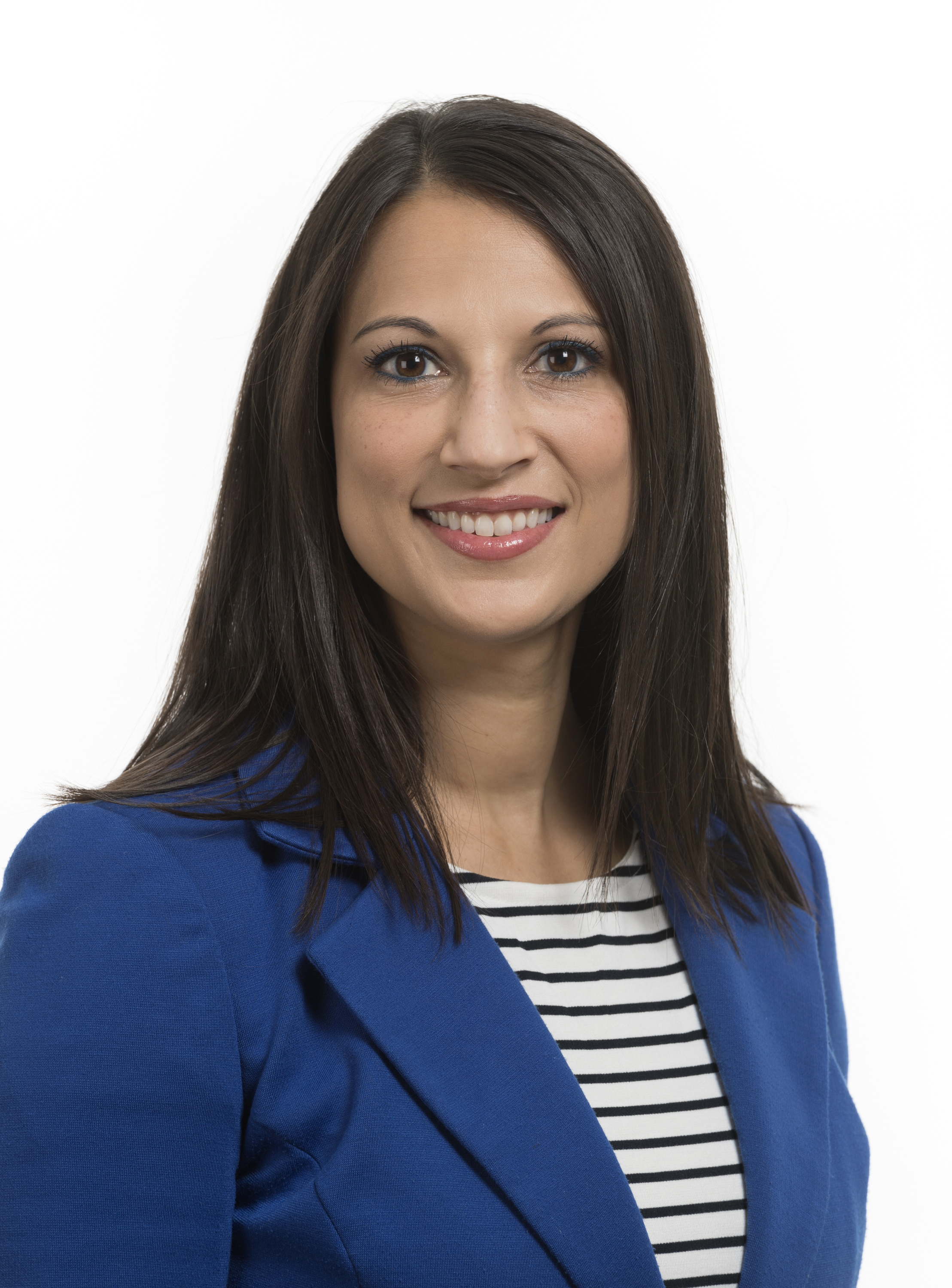
“Being able to find a provider who is affirming and really understands you is important to your health,” said Gina Fambrough, senior director, health equity operations and performance. “Now, patients can be assured that they're seeing someone who they can really connect with.”
2. Transcultural health managers (THMs) help ensure an inclusive, welcoming environment for all patients by providing Novant Health team members with customized education and strategies related to gender identity, sexual orientation, race/ethnicity, age and other dimensions of diversity.
This is especially helpful when it comes to serving vulnerable populations like the LGBTQ+ community. THMs support the clinical teams in setting them up for success in caring for this community and ensuring an inclusive environment, which creates a more remarkable patient experience and better outcomes for our LGBTQ+ patients.
3. Diversity, inclusion and equity training is offered to all Novant Health team members, and includes education on providing inclusive health care. This helps ensure all team members — including health care providers — possess cultural competence to care for and affirm this population. To date, approximately 95% of Novant’s workforce has completed the training.
“This is an internal education program, but it equips us to better serve everyone in every setting,” Fambrough said. “From using the correct terminology to adopting culturally appropriate behaviors, it helps us deliver a remarkable, inclusive patient experience.”




